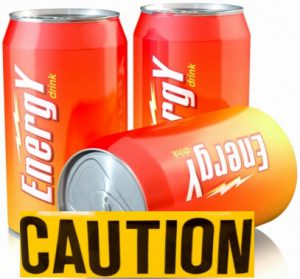Caution with Energy Drinks
 A teenage athlete recently asked me three questions about energy drinks as part of his work on a science project. Kudos to the teacher who assigned this important topic in teen health, and here are the questions and my answers for your reference.
A teenage athlete recently asked me three questions about energy drinks as part of his work on a science project. Kudos to the teacher who assigned this important topic in teen health, and here are the questions and my answers for your reference.
Q1. In your opinion do you think it’s okay for teens to drink energy drinks?
A1. I do not recommend teens consumer energy drinks. Dietitians of Canada and Health Canada’s position is that “Energy drinks are NOT recommended for children and adolescents. (Energy drinks are also NOT recommended for pregnant or breastfeeding women or caffeine sensitive individuals.) Although consumption of Energy drinks is not recommended in reality I understand some teens do use them and sale of Energy Drinks to teens is not prohibited. Teens should follow the precautionary recommendations of limiting caffeine intake to 2.5 mg caffeine/kg body weight/day. For example a 160 lb (72 kg) teen should limit daily caffeine intake to 180 mg caffeine which is equivalent to approximately what can be found in a medium coffee. Health Canada requires the amount of caffeine to be labelled on Energy drinks, so have a look at the label to be sure.
The key message for teens to know is that Energy drink should NOT be consumed in excess and should not be mixed with alcohol.
Source: Health Canada http://www.hc-sc.gc.ca/ahc-asc/media/nr-cp/_2011/2011-132bk-eng.php
Q2. Is there a healthy alternative to energy drinks?
A2 Yes, Water is your best choice of beverage during most types of activity. Use a sports drink during long or intense exercise. Sports drinks have specific amounts of sugar and salts (such as sodium and potassium). The sugar helps to keep you exercising longer and harder while the salts help replace some of the nutrients you lose when you sweat. Energy drinks are not the same as sports drinks and should not be confused with sports drinks such as Gatorade® or Powerade®.Energy drinks contain caffeine and they tend to be higher in sugar which can make them harder to absorb during exercise and could cause stomach upset. Drinking energy drinks during exercise can lead to dehydration.
Source EatrightOntario.ca http://www.eatrightontario.ca/en/Articles/Caffeine/Energy-Drinks-FAQs.aspx#.Ul9c3FCshcY
Q 3 What’s the best way to combine sleep and food/ drink or energy drinks for exercise?
A3: A good night of sleep is key for peak performance and goes hand in hand with good nutrition that supports everyday exercise and enhances sport performances. On the other hand, currently there is no evidence to support that energy drinks are an important or beneficial addition to the diet.
Feeding kids well who participate in sports poses unique challenges for parents. For example athletes require more food and may not be home for many mealtimes compared to a less active youth. For tips on fuelling the young athlete read this terrific Dietitians of Canada resource: http://www.dietitians.ca/getattachment/b1399d82-da71-46e2-b19f-28eb0203468b/Factsheet-Fuelling-the-Young-Athelete.pdf.aspx